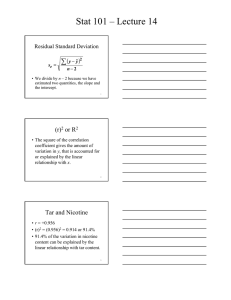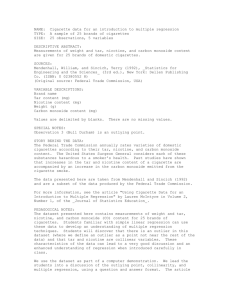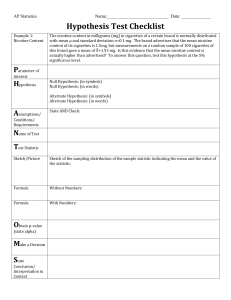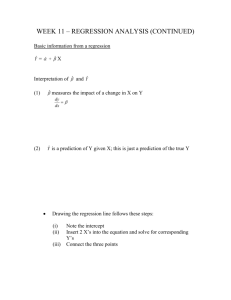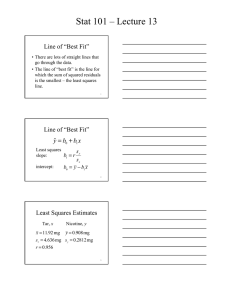Exam 1 Review
advertisement
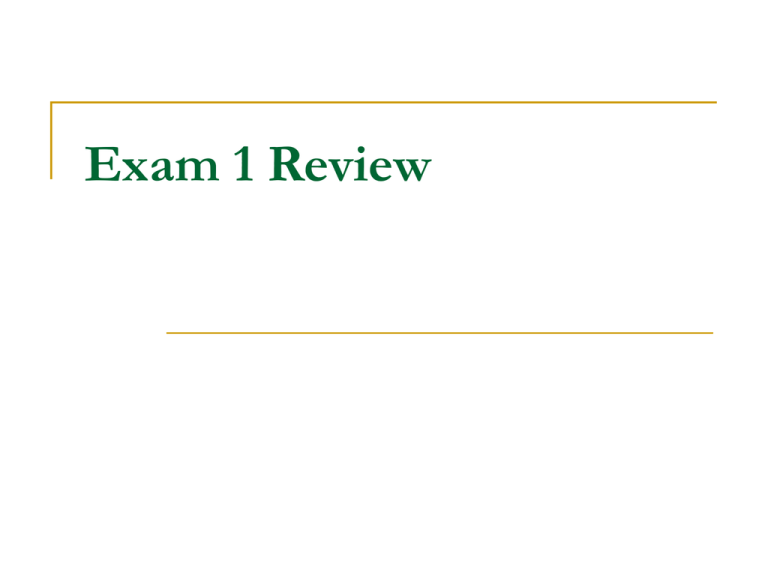
Exam 1 Review Data referenced throughout review The Federal Trade Commission annually rates varieties of domestic cigarettes according to their tar, nicotine, and carbon monoxide content. The United States Surgeon General considers each of these substances hazardous to a smoker's health. Past studies have shown that increases in the tar and nicotine content of a cigarette are accompanied by an increase in the carbon monoxide emitted from the cigarette smoke. Foundations (1) Are sex, ethnicity and political party categorical or quantitative variables? Foundations (2) The two branches of statistics are: ______________ and ______________. Foundations (3) Is oF an interval or ratio measurement? Explain. Foundations (4) Explain how a statistic and a parameter are related. Foundations (5) Which of the following variables has the greatest variation? Variable Tar cont Nicotine Carbon Mean Median StDev 12.22 12.80 5.67 0.876 0.9000 0.3541 12.528 13.000 4.740 r, 2 r, 2 R (1) The correlation measures the ______ and ______ of the linear association between two variables. r, 2 R (2) Based on this plot of Nicotine vs. CO level and common knowledge, do you feel that simple linear regression is a sound choice of analysis in this setting? Explain. Carbon monoxide content (mg) 2 r, 20 10 0 0 1 Nicotine content (mg) 2 r, 2 r, 2 R (3) In this study, the correlations between the variables are: Nicotine (x1) and CO (y): 0.977 Tar content (x2) and CO (y): 0.957 Nicotine (x1) and Tar content (x2): 0.926 Which variables would be helpful for explaining CO levels? Explain any concerns you might have about including both predictors in a multiple regression model? r, 2 r, 2 R (4) If you find a very strong linear correlation between two variables x and y, would you claim that a causal relationship exists between these variables? Explain. r, 2 r, 2 R (5) Minitab reports both the R-square and the Rsquare (adjusted) values for models. Explain why R-square (adjusted) is a better estimate as compared to R-square. Hypothesis Testing (1) In a hypothesis test, if the p-value = .94 and you have set alpha at .05, would you reject or fail to reject the null hypothesis? Hypothesis Testing (2) If p < α, you would _____ H0. Hypothesis Testing (3) If H0 is true and we reject it, we have made a ___________________ error. Hypothesis Testing (4) In hypothesis testing, if I reject the null hypothesis, can I accept that the research hypothesis is correct? Explain. Hypothesis Testing (5) When I conduct significance tests for the individual variables in a multiple regression model, what am I testing? Interpreting Regression Results (1) Based on the sample, the simple linear regression equation to estimate CO from Nicotine Level is: CO content = 1.66 + 12.4 (Nicotine content) Identify and interpret the slope in the context of this problem. Interpreting Regression Results (2) have an R-square (adj.) value of 85.1%. Explain what this means. Interpreting Regression Results (3) The F-statistic for the multiple regression model for estimating CO Level from Nicotine and Tar Content is F (2,22) = 124.11, p= 0.00. If α= .01, what do you conclude? Interpreting Regression Results (4) If I have a simple linear regression model and a multiple regression model to predict the same dependent variable, the Sum of Squares for the model (SSM) increases with the multiple regression model, but the Sum of Squares Total (SST) is equal for both models. Explain why. Interpreting Regression Results (5) Does each of the following predictor variables contribute significantly to the model? (report the tvalue, df, and p-value tests of significance.) CO content = 3.09 + 0.962 Tar - 2.65 Nicotine Predictor Constant Tar cont Nicotine Coef 3.0896 0.9625 -2.646 SE Coef 0.8438 0.2367 3.787 T P 3.66 0.001 4.07 0.001 -0.70 0.492
